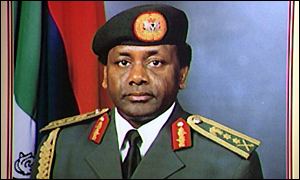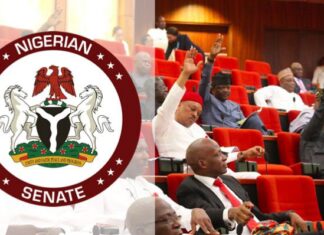Sixteen years after the death of military Head of State, Sani Abacha, Senior Correspondent, ISHAYA IBRAHIM, examines his regime against the current political dispensation
Sani Abacha
A crucial election had been billed to hold on August 1, 1998, to elect a president. All the five political parties in the contest had adopted the Head of State, General Sani Abacha, as their candidate. Curiously, Grassroots Democratic Movement (GDM), which had appeared to have a mind of its own, got caught by the bug. The party’s candidate was Mohammed Dikko Yusufu, a former Inspector General of Police IGP). But when the time came for the GDM primaries, some party members, pandering to bribes or threats, pushed aside their own, in favour of Abacha, who was not even a member of the party.
On June 8, 1998, two months to when he was supposed to emerge a civilian president in an election that looked more like an affirmation, Abacha died. He was three months away from 55 years old. That was exactly 16 years ago, today.
Given the torrent of endorsements, in addition to a one million-man rally led by one Daniel Kanu to compel him to contest, Abacha would have won the election in an unchallenged contest and would have emerged a civilian dictator, had death not come calling.
But 16 years after, analysts insist that the quality of the politics in Nigeria, to some extent, looks very much like the Abacha days. They argue, for instance, that the political class is still for the highest bidder, especially as aspirants to political offices need godfathers to facilitate their victory, irrespective of their abilities or inabilities.
Also, infrastructure remains dilapidated, experts note. They add that unemployment has exploded to a record high in the country’s history. Electric power supply has still not improved; universities are always on strike, and their fees, largely unaffordable for the common man, it has been further observed.
Despite these worsening conditions in the country, analysts warn on attempts at comparing the two situations, principally, given that Abacha largely ran a bad government, characterised by human rights abuses.
The late Head of State was born on September 20, 1943 in Kano, although he was a Kanuri from Borno State.
He attended the Nigerian Military Training College and Mons Officer Cadet School before being commissioned as a second lieutenant in 1963.
According to online encyclopaedia, Wikipedia, Abacha’s military career was marked by a string of successful coups.
“He is by some records the most successful coup-plotter in the history of Nigeria’s military. He took part in the counter-coup of July 1966, from the conceptual stage, and may have been a participant in the Lagos or Abeokuta phases of the January 1966 coup. He was also a prominent figure in every single successful coup in Nigerian history, two of which brought and removed General Muhammadu Buhari from power in 1983,” it states.
On August 27, 1985, General Ibrahim Babangida became Nigeria’s sixth head of state and Abacha, one of the leaders of the coup, was named Chief of Army Staff (COAS). Abacha was later appointed Minister of Defence in 1990.
In 1993, Moshood Kashimawo Olawale Abiola, popularly known as MKO, won the presidential election regarded as the freest and fairest in Nigeria’s political history. But Babangida annulled it, giving no valid reasons.
Following pressure from democracy activists, Babangida stepped aside, and handed power to the short-lived transition government of Ernest Shonekan, a businessman from Abiola’s geographical zone – the South West.
On November 17, 1993, Abacha overthrew Shonekan in a bloodless coup. In September 1994, he issued a decree that placed his government above the jurisdiction of the courts, effectively giving him absolute power. Another decree gave him the right to detain anyone for up to three months without trial.
The down side of Abacha’s government was his human rights record, the hallmark of which was the hanging of Ogoni activists, Ken Saro-Wiwa and eight others. He also jailed Abiola and General Olusegun Obasanjo on treasonable charge. Nobel Laureate, Prof. Wole Soyinka, was also charged in absentia with treason.
Abacha died in June 8, 1998 at the presidential villa in Abuja and was buried on the same day. Wikipedia reports that he was buried without an autopsy, fuelling speculation that he may have been executed extra judicially by way of being poisoned by political rivals in one way or another.











